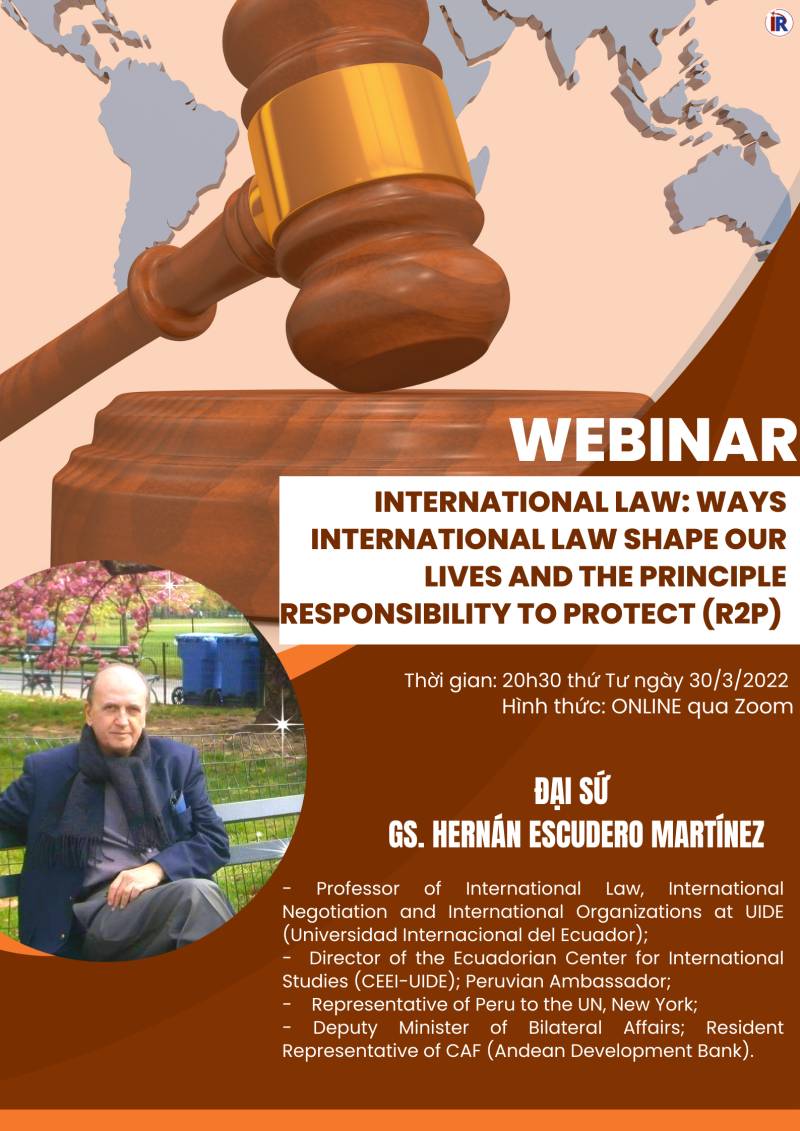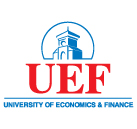Webinar "Ways International Law shape our lives and the principle responsibility to protect (r2p)"
To create a discussion forum for lecturers and students of the Faculty of International Relations (IR) related to the subject International Organizations; improve specialized knowledge, independent thinking skills, critical thinking, knowledge relations between subjects and political events for students majoring in International Relations in particular as well as UEF students in general about The role and the way that international law shapes people's lives, Faculty of International Relations organizes Webinar "International Law: Ways International Law shape our lives and the principle responsibility to protect (r2p)" at 20:30, Wednesday, March 30, 2022 on Zoom platform and online livestream on Fanpage of the Faculty of International Relations.

Webinar with the presence of Dr. Tran Thanh Huyen, Dean, Faculty of International Relations, students of Faculty of International Relations, UEF students and students of other universities are interested. The guest speaker is Ambassador Prof. Hernán Escudero Martínez, Professor of International Law, International Negotiation and International Organizations at UIDE (Universidad Internacional del Ecuador); Director of the Ecuadorian Center for International Studies (CEEI-UIDE); Peruvian Ambassador; Permanent Representative at WTO, Geneva, Switzerland; Permanent Representative of Peru to the UN, New York; Deputy Minister of Bilateral Affairs; Resident Representative of CAF (Andean Development Bank).

At the beginning of his talk, the Ambassador posed the question "What is International Law?" According to the Ambassador, International Law is a system of treaties and agreements between states that govern the way in which states interact. Next, the Ambassador listed four sources of International Law including: (1) treaties and conventions; (2) custom, general principles of law, (3) decisions and (4) judiciary. International law has the main purpose and role of promoting justice, prosperity and peace throughout the world. This is a measure to prevent armed conflict between countries and help them strengthen their mutual relations. The rules of International Law are found in treaties, conventions, declarations, agreements, custom and other sources.

The main content of the talk focused on answering the question: What is the role of International Law in life? To help students have a systematic view of the above question, the Ambassador used many specific examples, typically treaties, agreements, legal documents on a global scale, and emphasized 07 main aspects that international law affects. They are: in daily life; away from home; liberty and fundamental rights; public health and environment; economic development and commercial life; peace and security; public safety and social development.


Before conducting a detailed analysis of the above 07 aspects, the Ambassador showed a video clip titled "International Law around us" to provide people's perspective when it comes to International Law, specifically: Many images appear such as war-peace, humanitarian crisis, environmental protection, sustainable development, protection of human social rights or international crime. In the context of globalization, both individuals and countries have to interact a lot, so there is a need for a common rule to maintain interaction and anticipate changes in the performance of work. Therefore, international law has a profound influence on social life. The Ambassador demonstrated the above statement with specific examples as follows:

First, in daily life: sending mail-packages easily according to the constitution of the Universal Postal Union; drive safer with the help of the global positioning system - GPS (constitution of the International Telecommunication Union); watch news and events around the world; have important qualification documents recognized worldwide according to the Hague Apostille Convention.
Second, away from home : shorter flight time with many direct flights according to Chicago Convention on International Civil Aviation; destination weather updates before you depart according to the Convention of the World Meteorological Organization; Convention for the Unification of Carriage Regulations by Air.
Third, liberty fundamental rights: The Ambassador gave some examples such as humanitarian counter-terrorism under the Convention Against Torture and Other Cruel, Inhuman or Degrading Treatment or Punishment or freedom of movement within the European Union. The EU under the Schengen Convention was signed on 14 June 1985, which is a treaty leading most European countries towards the elimination of their national borders, in order to build a Europe without borders.
Fourth, public health and environment: The plan to tackle and prevent dangerous diseases according to the International Health Regulations of WHO is an international legal instrument that includes measures to prevent the transnational spread of diseases. Infectious. Or allowing countries to manufacture drugs and pharmaceuticals from patented materials or to import clearly sourced ingredients under The WTO Agreement on Trade-Related Aspects of Intellectual Property Rights or the Vienna Convention on the protection of the ozone layer is a multilateral environmental agreement signed in 1985 that provides a framework for reducing the production of chlorofluorocarbons due to their harmful effects on ozone depletion, leading to an increased risk of skin cancer.
Fifth, economic development and commercial life: Principles of International Commercial Contracts of 2010 is a document prepared by The International Institute for the Unification of Private Law to support the harmonization of international law on commercial contracts; or the promotion and assurance of stable world currency transactions as embodied in the regulation of the International Monetary Fund - the international organization that oversees the global financial system by monitoring exchange rates and balance of payments, as well as technical support and financial help when required.
Sixth, peace and security, the Ambassador cited the United Nations Security Council - an important and regular political body of the United Nations, mainly responsible for maintaining peace and security. international security, recommend the admission of new United Nations members to the General Assembly, and adopt any changes to the Charter of the United Nations. Founded in 1949 with the signing of the Washington Treaty, NATO is a security alliance consisting of 30 countries from North America and Europe. The fundamental objective of NATO is to protect the freedom and security of the Allies by political and military means.
Seventh, public safety and social development: The Hostage Convention is a United Nations treaty whereby states agree to prohibit and punish hostage taking. Preventing the Use and Distribution of Stimulants and Psychotropic Drugs: Convention on Psychotropic Substances1971 is a United Nations treaty designed to control psychoactive drugs such as amphetamines, barbiturates, benzodiazepines and hallucinogens, besides, the Ambassador also analyzed examples related to aspects such as anti-discrimination in education; refugee protection, gender equality.


Finally, there is a section to answer questions from the participating students related to International Law. The questions focused on practical issues using International Law, the impact of International Law on countries, and the legal system of Ecuador. It can be seen that, by citing and analyzing legal documents in the world, the Ambassador has provided a lot of detailed, useful knowledge, with high professional, academic and systematic content to the members. Students who are interested in International Law of the Faculty of International Relations in particular and UEF students in general.
The seminar received feedback from the students that they were very interested in the shared content, they felt the content was very useful and helped them gain more knowledge for the subjects. You also shared that you feel very honored to have the opportunity to study and listen to practical sharing from the speaker who is a diplomat and professor of international law.
News + Photo: FIR - UEF










